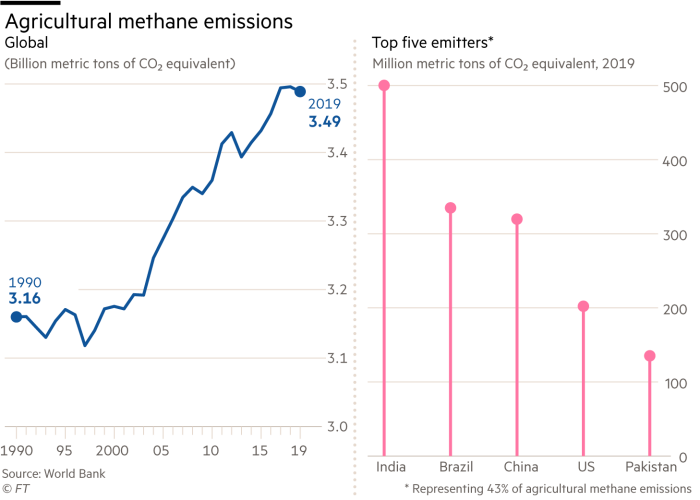Methane tax: Kiwis try to raise revenues from ruminants
Raising revenues from cows gives new meaning to the word moolah. New Zealand’s prime minister Jacinda Ardern has proposed just such a tax on the methane released by ruminants. Predictably, the plan is unpopular with beef and sheep farmers already facing higher input costs. Demand for these two meats is relatively sensitive to price.
Climate scientists really hate methane, a greenhouse gas with some 80 times the warming effect of carbon dioxide. More than half of global methane emissions derive from fossil fuels and waste. America’s new Inflation Reduction Act includes a methane tax to limit those from the former. But roughly 40 per cent of methane emissions come from agriculture, mostly from ruminant burps and their manure.
Emissions have increased steadily, by a tenth, in the last 20 years to 3.5bn tonnes of CO2e.
Debate has raged over what to do about this sector for years. Indeed, New Zealand’s farmers have faced the threat of such a tax before, 20 years ago. Farmer protests helped defeat it then.
New Zealand’s agricultural methane emissions, about 27mn tonnes in 2019, have not changed much since then, according to World Bank data. Despite having more than five times as many sheep as people, New Zealand is a tiddler among methane emitters. The biggest five, including Brazil, India and China, represent 43 per cent of agricultural methane emissions.

As the first country to introduce an agricultural methane levy, New Zealand will set the standard. It will depend on factors including number of animals, the size of the farm and efforts of owners to mitigate emissions, such as by varying the type of feed.
If the levy is implemented, Ardern has promised to recycle proceeds by helping laggard local meat farmers cut their methane. Even so, one would assume that farmers would try to pass added costs on to consumers, hitting demand.
A 2010 US study on price sensitivity (elasticity) covering 70 years revealed that increasing beef prices would have three times the impact on demand as it would on much more commoditised farm produce such as eggs. More recent studies confirm this.
New Zealand’s efforts to tax methane merit attention. Getting it past farmers there will be hard enough. In countries with large agricultural emissions, such as India and Brazil, the political prospects for that though stink.
For all the latest Business News Click Here
For the latest news and updates, follow us on Google News.
